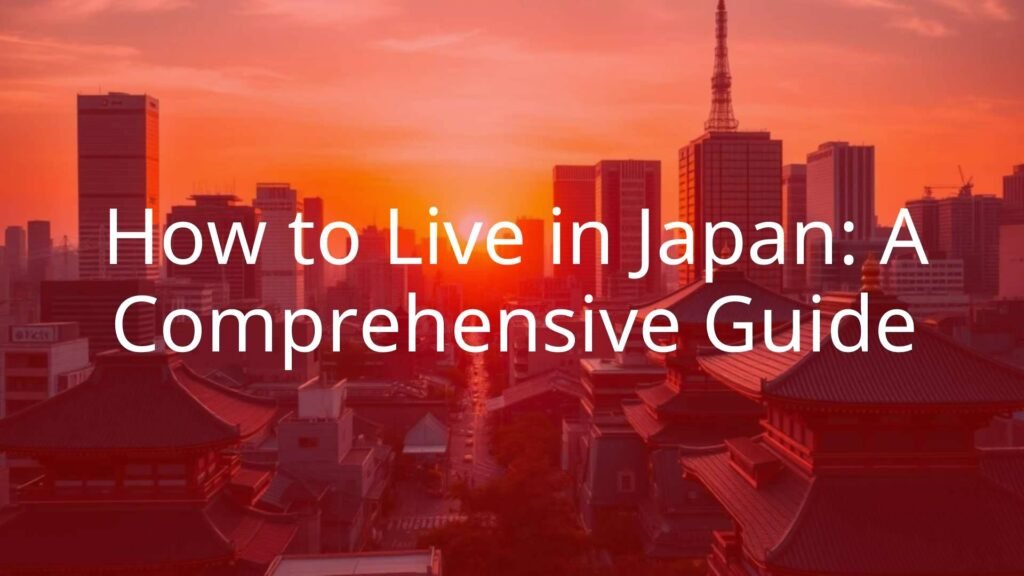Moving to Japan can seem overwhelming, but it is possible with careful planning. Japan is known for its mix of old and new traditions, a high standard of living, and a unique culture. If you want to move there, you’ll need to go through steps like getting a visa, understanding the job market, finding housing, and learning how to adapt. This guide will break down the necessary steps and information you’ll need for a smoother move to Japan.
What Should You Know Before Moving to Japan?
Before you move to Japan, it helps to be prepared. Japan’s natural beauty includes snowy mountains and warm beaches, while cities like Tokyo, Kyoto, and Osaka are busy and modern. However, Japanese culture is based on traditions and social rules that can be unfamiliar to newcomers. You’ll need to be ready for things to work differently than you might expect.

Living in Japan is much different than visiting for a short time. To fit in, you have to adjust to how things are done. The government has tried to make it easier for foreigners to live in Japan, and as of 2024, about 3.2 million non-citizens live there. However, being open-minded and well-prepared is important for success.
Do You Need to Learn Japanese?
Japanese is the main language, and most people speak little English. Only about 28% have some English skills, and less than 10% are fluent. If you do not speak Japanese, daily life will be difficult, especially outside large cities. Knowing the language helps you get better jobs and be part of the local community. Japanese is considered hard for English speakers, but even basic skills can be very helpful. You can take lessons online or in person to start learning before you arrive.

Should You Visit Japan First?
Yes, it’s best to visit before moving. Aim for a stay of at least a month to get used to daily life and not just the tourist experience. Try normal activities and see how you adjust. Visiting first can prepare you for culture shock and help you decide if you are ready for the changes ahead.
Is Travel or Expat Insurance Required?
Japan has very good healthcare, but having insurance is smart. For stays of up to three months, travel medical insurance isn’t required but is recommended. If you plan to stay longer, you must sign up for Japan’s National Health Insurance (NHI) within 14 days of moving in. NHI covers 70% of your medical costs, and you pay about JPY 2,000 per month for the first year. If you are a digital nomad, you need private health insurance that covers about JPY 10,000,000 (around $70,000). Some foreigners also get extra insurance for better coverage and English-speaking doctors.
What Are the Visa Options for Living in Japan?
If you don’t have Japanese citizenship or a Japanese spouse, you need a visa to live in Japan. The process usually starts with a Certificate of Eligibility (COE), which can take 1-6 months to get. With the COE, you then apply for a visa at your nearest Japanese consulate, which takes a few weeks. Japan doesn’t give visas when you arrive, so you must finish all paperwork before you move. There are three main groups of visas: Working, Non-working, and Family-related visas, each with different rules.
| Visa Category | Purpose | Main Requirements |
|---|---|---|
| Tourist/Short-Term | Visit up to 90 days | Most countries: no visa needed under 90 days |
| Student/Exchange | Studying at a school/university | School admission, funds, sometimes entrance exams |
| Work Visas | Employment in Japan | Bachelor’s degree or relevant experience, job offer |
| Highly Skilled Professional | Specialized work | Points-based, advanced skills |
| Working Holiday | Work and travel for young people | Age 18-30, funds (varies by country) |
| Digital Nomad | Remote work | High income, foreign employer, private insurance |
| Dependent/Family | Join family in Japan | Relation to a resident/work visa holder |
| Business/Startup | Starting/managing a business | Business plan, capital, physical office |
| Specified Skilled Worker | Labor in certain industries | Skills and language tests, no dependent visa |

- Tourist/Short-term visas: 67 countries do not need a visa for visits up to 90 days. Do not overstay your allowed time.
- Student/Exchange visas: Good for long stays and learning Japanese. Schools help with paperwork. You can work part time (up to 28 hours per week) on this visa. Scholarships are available for those with limited funds.
- Work Visas: There are many types for different jobs. For teaching or office jobs, a university degree is common. You can change jobs while keeping the same visa.
- Highly Skilled Professional: For people with special skills, this visa uses a points system and offers longer stays.
- Working Holiday: Young people (typically 18-30) from certain countries can live and work in Japan for up to 18 months. The US is not eligible.
- Digital Nomad Visa: For remote workers making over JPY 10 million per year, valid for 6 months, and allows you to bring family.
- Dependent, Spouse, Family: Spouses and kids of foreign workers get a dependent visa. If you are married to a Japanese national, you have more work freedom and can apply for permanent residency after three years.
- Business Manager/Startup: Need funds and a clear business plan. A startup visa gives you 6 months to a year to set up.
- Specified Skilled Worker: For jobs in areas like agriculture or care work, requires tests and is not renewable or eligible for permanent residence.
How to Find Work or Study in Japan
Getting a job or study spot is key for long-term visas. You can look for jobs online, especially in tech and teaching. Sites like Japan Dev and LinkedIn list jobs often open to foreigners. Agencies such as Morgan McKinley and Michael Page can help too, especially if you have good Japanese language skills.
English teaching is the most common work for foreign beginners. Usually, you’ll need a bachelor’s degree. The JET Programme is a well-known teaching program run by the government. Private English schools hire too. Pay can be modest, but it is a practical entry point.
For internships, some companies sponsor “Designated Activities” visas. Good performance can lead to job offers and work visas. Freelancers may find it harder, as you need stable contracts and a high annual income or a sponsor company. The digital nomad visa is a new option for freelancers but lasts only 6 months and has a high income requirement.

How to Find Accommodation in Japan
Renting in Japan is different than in other countries. Traditional homes might have features such as shoji (paper sliding doors), tatami (straw mats), and genkan (entry area). Most expats live in Tokyo, especially areas like Minato or Shibuya. Other popular cities are Osaka, Kyoto, and Kobe. Smaller cities offer a lower cost of living and can be a good choice depending on your job location and budget.
| City | Average Monthly Rent (3BR Apartment) |
|---|---|
| Tokyo | $2,713 |
| Nagoya | $1,764 |
| Yokohama | $1,365 |
| Kawasaki | $1,283 |
| Kyoto | $1,048 |
| Osaka | $1,022 |
| Kobe | $882 |
| Sendai/Hiroshima/Fukuoka/Sapporo | $690-770 |
Foreigners can buy property in Japan regardless of residency or visa status. This does not help with getting residency or citizenship. There is a land use law that gives the government some oversight in sensitive areas, but otherwise, property purchase is open to foreigners.

Checklist for Moving and Settling in Japan
- Apply for your visa and COE early
- Secure a job offer or school admission
- Save enough money for moving costs and deposits
- Start learning Japanese before arrival
- Register at your local city office within 14 days of moving for health insurance and other procedures
- If self-employed, remember to file your tax return by March 15th
Moving pets requires advance planning (about 7 months for all steps). This includes microchipping, vaccinations, and paperwork. Upon arrival, your pet may need to be quarantined. Check the Animal Quarantine Service website for details.
For shipping your belongings, Japan homes are often smaller, so only bring what’s necessary. Many items are easy to find in Japan. Compare international movers and decide between sea (cheaper, slower) or air (faster, pricier) freight.
What Is Daily Life Like in Japan?
Japanese daily life mixes efficiency, tradition, and modern comforts. The country ranks highly for safety and healthcare, with a life expectancy of 84 years. Honest, orderly, and respectful behavior is normal. However, many newcomers find the adjustment to social rules, language, and etiquette a challenge at first.
How Expensive Is Life in Japan?
Tokyo is expensive, but other cities cost much less. Utility costs depend on your usage-bills are often higher in summer or winter. Food is high quality and reasonably priced if you buy local items. Trains are reliable, so you likely won’t need a car in cities.
What Is Japanese Work Culture?
Workplaces in Japan are known for long hours, loyalty to employers, and a formal atmosphere. Unspoken rules include not leaving before your boss and following a hierarchy. Accepting business cards with two hands and bowing are required customs. While work can be strict, there is job security and benefits. The average annual salary is around $29,589 (¥4,580,000), which usually supports a comfortable lifestyle.
What Should You Know About Japanese Etiquette?
- Remove shoes when entering homes and some restaurants
- Bow when greeting, with deeper bows for more respect
- Don’t eat while walking or speak loudly in public
- Properly separate trash for recycling
- Show respect to elders and superiors at work and in social settings

What Are Common Culture Shock Experiences?
Most foreigners are surprised by the language barrier and strict social etiquette. Everyday tasks like renting an apartment or filing papers can feel slow and require stamps called hanko. Some customs, such as polite indirect speech, can be confusing. Navigating crowded sidewalks or adjusting to recycling rules are common challenges. Over time, most people get used to the differences and often grow to enjoy them.
What Are the Healthcare and Insurance Requirements?
Japan has a national health insurance system. If you stay longer than three months, you must join this program by registering at your city hall. The premium starts at about JPY 2,000 per month and can go up or down depending on your income and where you live. The government pays 70% of your medical costs, and you pay the other 30%.
For foreigners, finding English-speaking doctors is sometimes hard. Some people add private insurance for easier access to English services or extra coverage. Having a translation app can help during medical appointments.
How Do Banking and Taxes Work for Foreign Residents?
You’ll need a Japanese bank account for your salary and bill payments. Major banks like MUFG, Mizuho, and Sumitomo Mitsui are popular and may offer services in English. Bring your passport, resident card, proof of address, and a small deposit when opening an account.
If you are employed, your company usually deducts your income tax automatically. If you are self-employed, you must file your own tax return by March 15th each year. There are other taxes too, like yearly property tax if you own a home, business tax if you start a business, and capital gains tax on investment profits. Check if your home country has a tax treaty with Japan to avoid double taxation.
What Should You Know About Education in Japan?
Japan’s education system is strong, especially in math and science. School is mandatory until age fifteen, starting at kindergarten. Local public schools are free but teach in Japanese, which can be hard for non-native speakers. Many expats choose international schools that use English or other home-country curricula. These schools are mostly in Tokyo and can be expensive.
| Education Option | Language | Cost |
|---|---|---|
| Public School | Japanese | Free (except for extras) |
| International School | English/Other | ¥610,000 to ¥6,000,000 per year |
| University | Japanese/Some English programs | Tuition and fees vary; scholarships available |
Frequently Asked Questions About Living in Japan
Is Japan Safe for Expats?
Japan is one of the safest countries, with very low crime rates. Petty crime like bike theft exists, but violent crime is rare. Many people feel comfortable walking alone at night. Common sense safety is still important anywhere.
Can Foreigners Drive in Japan?
Yes, but you need an International Driving Permit (IDP) valid for one year or a Japanese driver’s license. Changing your license for a Japanese one can take time and paperwork. In cities, public transportation is so good that a car is often unnecessary.
What Support Networks Exist for Expats?
There are many expat groups, both online and in-person, to help new arrivals. Websites, social media groups, and local international centers offer support, information, and events to help you get used to life in Japan. Embassies and community organizations are also good resources.
- What Is a Maiko? - July 13, 2025
- What Does Domo Arigato Mean? - July 12, 2025
- What Does Naruto Mean? - July 12, 2025









